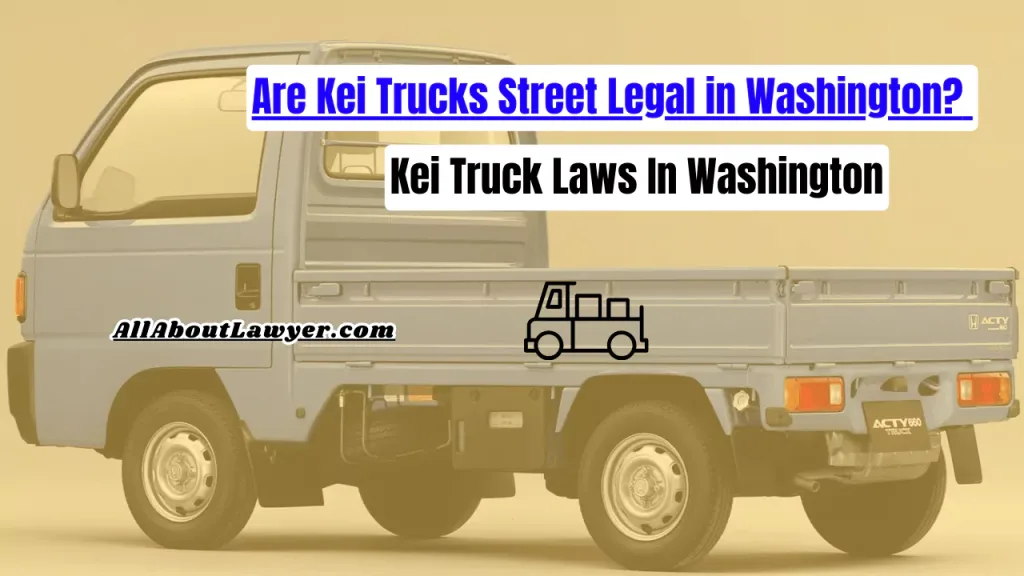Are Kei Trucks Street Legal in Washington? Kei Truck Laws In Washington
Washington State, renowned for its lush landscapes and vibrant cities, attracts a diverse array of vehicle enthusiasts, including those interested in Kei trucks. These compact Japanese mini-trucks are celebrated for their practicality and efficiency. If you’re considering driving a Kei truck in Washington, it’s crucial to understand the local laws and regulations that affect their legality. This guide provides detailed information on whether Kei trucks are street legal in Washington and what steps you need to follow to ensure compliance.
Table of Contents
State-Specific Kei Truck Laws in Washington
In Washington, Kei trucks are subject to specific rules that determine their legality for street use. Here’s what you need to know:

Road Use Restrictions
Washington State classifies Kei trucks under low-speed vehicle (LSV) regulations, which means they are subject to certain restrictions:
- Roads and Highways: Kei trucks are allowed on roads with a speed limit of up to 35 mph. They are generally not permitted on highways or roads with higher speed limits unless specifically authorized.
- Local Regulations: Different municipalities in Washington may have their own rules regarding the operation of Kei trucks. It’s important to check with local authorities for any additional restrictions or requirements.
Vehicle Registration
To legally operate a Kei truck in Washington, you must complete the registration process through the Washington State Department of Licensing (DOL):
- Documentation: Provide proof of ownership, the vehicle title, and any other required documents when registering your Kei truck.
- Inspection: Kei trucks must pass a safety inspection to ensure they meet Washington’s standards for roadworthiness.
Safety Requirements
Kei trucks must comply with specific safety standards to be street legal in Washington:
- Lighting: The truck must have functional headlights, brake lights, turn signals, and reflectors.
- Mirrors and Wipers: The vehicle should be equipped with rearview mirrors and windshield wipers.
- Safety Equipment: Ensure the truck has other necessary safety features, such as seat belts and a properly functioning braking system.
Insurance Requirements
In Washington, Kei trucks must have liability insurance similar to other vehicles. This insurance covers damages or accidents that may occur while driving the truck.
Benefits of Kei Trucks in Washington
Kei trucks offer several advantages that make them a popular choice in Washington:
Urban and Rural Versatility
In Washington’s diverse environments, Kei trucks are valued for their compact size and maneuverability. They are well-suited for navigating both city streets and rural roads.
Cost Efficiency
Kei trucks are generally affordable to purchase and maintain. Their fuel efficiency and low operating costs make them an economical option for many Washington residents.
Environmental Benefits
With their smaller size and efficient engines, Kei trucks can contribute to lower emissions compared to larger vehicles, aligning with Washington’s environmental goals.
Steps to Legalize a Kei Truck in Washington
To ensure your Kei truck is legal on Washington roads, follow these steps:
- Register the Vehicle: Visit the Washington State Department of Licensing (DOL) with necessary documentation, including the vehicle title and proof of ownership.
- Pass Safety Inspection: Ensure the truck meets Washington’s safety requirements, including functional lighting, mirrors, and other essential equipment.
- Obtain Liability Insurance: Acquire liability insurance to comply with Washington’s insurance requirements for registered vehicles.
- Check Local Ordinances: Verify any local regulations or restrictions that may apply to the operation of Kei trucks in your area.
Challenges of Registering Kei Trucks in Washington
While Kei trucks have many benefits, there are challenges to consider:
Local Restrictions
Different cities and counties in Washington may have their own rules regarding Kei trucks, which can add complexity to the registration process.
Safety Compliance
Meeting Washington’s safety and equipment standards might require modifications or additional inspections, especially if the vehicle is not originally designed for U.S. roads.
Insurance and Registration
Securing insurance and completing the registration process can be time-consuming and may involve navigating specific state requirements.
Final Thoughts About Kei Trucks in Washington
Kei trucks can be a practical and versatile vehicle choice in Washington State, offering benefits in both urban and rural settings. By understanding and complying with Washington’s regulations, including road use restrictions, safety standards, and insurance requirements, you can ensure your Kei truck is street legal. For the most accurate and up-to-date information, always consult with local authorities or the Washington State Department of Licensing.
FAQs About Kei Trucks in Washington
Can Kei trucks be driven on highways in Washington?
Kei trucks are generally limited to roads with speed limits of 35 mph or lower. They are not typically allowed on highways unless specifically authorized.
How do I register a Kei truck in Washington?
To register a Kei truck, visit the Washington State Department of Licensing (DOL) with the necessary documents, including proof of ownership and the vehicle title.
What safety features are required for Kei trucks in Washington?
Kei trucks must have functional headlights, brake lights, turn signals, rearview mirrors, and windshield wipers to comply with safety regulations.
About the Author

Sarah Klein, JD, is a licensed attorney and legal content strategist with over 12 years of experience across civil, criminal, family, and regulatory law. At All About Lawyer, she covers a wide range of legal topics — from high-profile lawsuits and courtroom stories to state traffic laws and everyday legal questions — all with a focus on accuracy, clarity, and public understanding.
Her writing blends real legal insight with plain-English explanations, helping readers stay informed and legally aware.
Read more about Sarah
